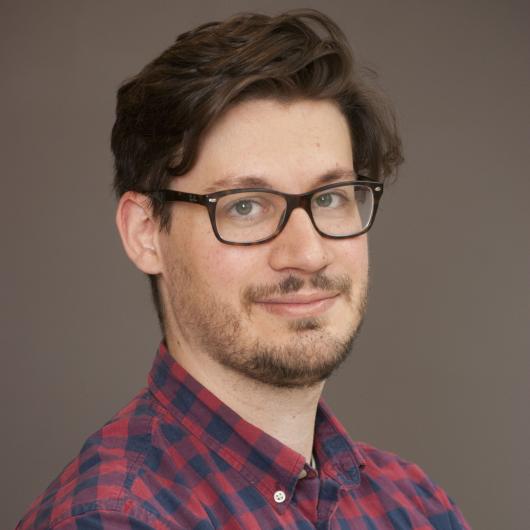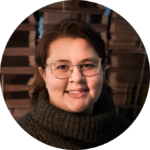Do language and conversational interactions vary by gender?
The study of sociolinguistics tells us how language differs in time and space, and how our means of communication portray self-identity.
When communicating with each other, we unconsciously relay aspects of our gender and identity. It’s impossible to focus purely on the content of what we’re saying without also experiencing and feeling the social meanings behind the things we say. The study of this interaction between language and society is known as sociolinguistics.
Professor Derek Denis, a sociolinguist at the University of Toronto Mississauga (UTM), began teaching JAL355: Language and Gender in 2017. The course was one of his first at the campus. “I have a long history with U of T,” says Professor Denis. He completed his undergraduate, masters, and PhD in linguistics at the St. George campus.
“In a lot of ways, sociolinguistics is the subfield of linguistics that very clearly connects to everyday life,” he explains. “It’s so relevant because we do so much with language.” Societal structures rely on interactions, and those interactions make up our understanding of identity in our culture.
Originally planning on pursuing studies in history, the Introduction to Linguistics course at U of T sparked Professor Denis’s interest in the field. “I had a great teacher in high school that suggested I take a linguistics course and I loved it,” he reflects. Having a brother who had just recently entered graduate school for sociology, the intersection between sociological studies and linguistics felt like a good fit for him.
In the second year of his undergraduate studies, Professor Denis joined a research opportunity that solidified his interest in sociolinguistics. He worked closely with Dr. Sali Tagliamonte, the active chair of the Linguistics Department at U of T. Dr. Tagliamonte is also a world-renown sociolinguist, having written multiple foundational books on the area of study. “It was an amazing opportunity at an early time in my career as a linguist,” recounts Denis.
JAL355 touches on a variety of sociolinguistic topics such as the linguistic analysis of interactions, turn-taking in conversations, and interrupting. Professor Denis typically begins the course by looking at some of the foundational work in the field such as Robin Lakoff’s Language and Woman’s Place. Published in 1973, Lakoff’s research is one of the first to address language and gender from a feminist perspective. According to him, the perspective of women being below men is reflected by the way women are told to speak: through avoidance of statements and the use of uncertain expressions.
Another topic discussed in the course is the emerging study of trans sociolinguistics. “A number of scholars including Lal Zimman, Lex Konnelly, Kirby Conrod, and others are doing amazing work in thinking about trans people’s relationship with language,” explains Professor Denis. “Not only [do they] use language as a means of identity expression, but also as a tool for resisting and subverting cis-normative ideologies in our society.”
JAL355 also provides students with qualitative data analysis skills, where interactions are carefully studied to identify linguistic features that comment on gender and identity. This type of linguistic analysis is one of the main components of the course, with students having the opportunity to actively use these skills.
Michelle Troberg, an associate professor in the Linguists department, first approached Professor Denis to teach JAL355 prior to his arrival at UTM. “I was hesitant at first because I identify as a cis-gendered, heterosexual man,” he says. “I knew that people’s lived experiences of oppression under patriarchal systems and cis-normativity would offer more value than the knowledge and ‘facts’ I had on the subject.”
After reflecting with colleague and PhD candidate Lex Konnelly, Professor Denis came to an important realization: “Even though I’m a cis-gendered heterosexual man, so much of that part of my identity does depend on systems of gender ideology.”
Since then, he has made an effort to defer to student’s experiences in the class who have different experiences and identities. “We have such rich discussions with the diversity of students in the course,” adds Professor Denis.
While JAL355 is a third-year course, there are only a few prerequisites (LIN256 or JAL253 or ANT204 or WGS200) to be enrolled in it. “That’s because the course is intended to be taken by students who have either a background in linguistics, anthropology, or women and gender studies,” says Professor Denis. Most students enrolled in the course tend to be linguists, however students from other departments who might not have as much background in linguistics are always present. To accommodate for those students, Professor Denis tries to stay away from heavy linguistic jargon and introduces topics with the assumption that they might not have knowledge from previous courses.
Professor Denis’s current research focuses on Multicultural Toronto English. Dialect formations, such as the emerging way of speaking in Toronto, intrigues him. Similar topics of language contact are discussed in another UTM course he teaches called LIN357: English Worldwide. The course discusses variations of English around the world, and it reflects on the consequences of English as a global language.
He has multiple publications in the field, from settler colonial varieties of English and social meanings of utterances in Canadian English, to instant messaging linguistics. One of Professor Denis’s most popular essays, A note on mans in Toronto discusses innovations to Toronto English made by multiethnic teens and their use of the plural noun “mans.”
The study of sociolinguistics is increasing in interest. While communities address patriarchal and cis-normative societal structures, our means of communication are also being addressed, highlighting the importance of studying sociolinguistics.
Associate Features Editor (Volume 48 & 49) — A recent graduate from UTM, Dalainey is currently working on completing her post-graduate studies in Professional Writing in Ottawa. She previously served as Staff Writer for The Medium‘s 47th Volume and as Associate Features Editor for Volume 48. Through her passion for languages, Dal hopes to create a fun and inviting atmosphere for readers through her contributions to the paper. When she isn’t working, Dal focuses on developing digital art and writing her first novel. You can connect with Dal on her Instagram or LinkedIn.


